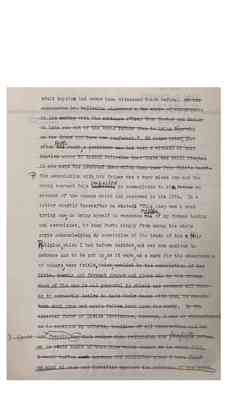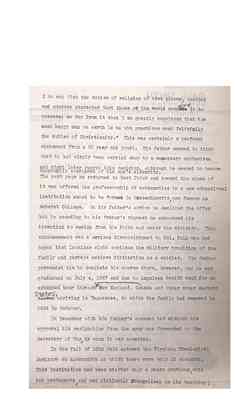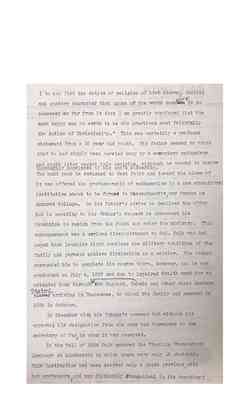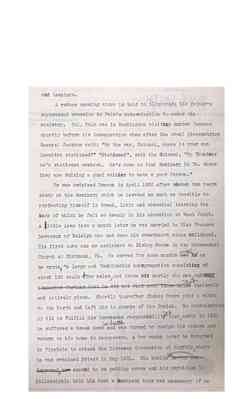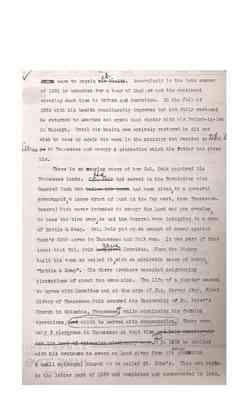Pages
6
adult baptism had never been witnessed there before. {Struckthrough: At its conclusion Dr. McIlvaine addressed a few words of exhortation to his ending with the sentence :"Pray Your Master and Savior to take you out of the World rather than to bring Reproach on the Cause you have now professed." 38 years later{{added: ,}} just after {{struckthrough: his}} {{added: Polk's}} death{{added: ,}} a gentleman who had been a witness of that baptism wrote to Bishop McIlvaine that there was still ringing in his ears the profound Amen which then came from Polk's heart.} {Insert paragraph mark} His association with his father was a very close one and the young convert felt {struckthrough: impressed} {added: impelled} to communicate to hi{"m" written over "s"} {struckthrough: father} an account of the change which had occurred in his life. In a letter shortly thereafter he states: "This step was a most trying one{added: ;} to bring myself to renounce {struckthrough: all} {added and struckthrough: some} {added: many} of my former habits and associates, to step forth singly from among the whole corps acknowledging my conviction of the truth of the {x-ed out: w} {"H" written over "h"}oly {"R" written over "r"}eligion{added: ,} which I had before derided{added: ,} and was now anxious to embrace and to be put up{added: ,} as it were{added: ,} as a mark for the observation of others{added: ,} were trials{added: .} {struckthrough: which{{added: ,}} unaided by the consolation of the Bible, humble and fervent prayer and above all by the strong Hand of Him who is all powerful to shield and protect all such as do earnestly desire to make their peace with him, he should have sunk over and again fallen back upon the world. By the especial favor of Divine Providence, however, I was so strengthened as to continue my efforts, heedless of all observation and can {{added: I can}} now {{moved from after "frankly": say}} frankly that rather than relinquish the prospects before me or y{{"i" written over "e"}}eld aught of that hope which cheers me in every duty, I would suffer {{struckthrough: such}} torture for centuries since I have found my mind at ease and fortified against the opinions of this world.}
7
I do not find the duties of religion of that gloomy, insipid and austere character that those of the world conc{struckthrough: ede; added: eive} it to possess; so far from it that I am greatly convinced that the most happy man on earth is he who practices most faithfully the duties of Christianity." This was certainly a profound statement from a 20 year old youth. His father seemed to think that he had simply been carried away by a momentary enthusiasm and might later regret this decision, although he seemed to become thoroughly convinced of his son's sincerity.
The next year he returned to West Point and toward the close of it was offered the professorship of mathematics in a new educational institution about to be formed in Massachusetts{added: ,} now famous as Amherst College. On his father's advice he declined the offer but in acceding to his father's request he announced his intention to resign from the Point and enter the ministry. This announcement was a serious disappointment to Col. Polk who had hoped that Leonidas might continue the military tradition of the family and perhaps achieve distinction as a soldier. His father pursuaded him to complete his course there, however, and he was graduated on July 4, 1827 and due to impaired health went for an extended tour through Canada{moved from after "New England"} New England, and other other Eastern {struckthrough: places} {added: states,} arriving in Tennessee, to which the family had removed in 1824 in October.
In December with his father's consent but without his approval his resignation from the army was forwarded to the Secretary of War{added: ,} by whom it was accepted.
In the fall of 1828 Polk entered the Virginia Theological Seminary at Alexandria at which there were only 15 students. This institution had been started only 4 years previous{added: ,} with two professors{added: ,} and was distinctly Evangelical in its teaching{added: s}
8
I do not find the duties of religion of that gloomy, insipid and austere character that those of the world conc{struckthrough: ede; added: eive} it to possess; so far from it that I am greatly convinced that the most happy man on earth is he who practices most faithfully the duties of Christianity." This was certainly a profound statement from a 20 year old youth. His father seemed to think that he had simply been carried away by a momentary enthusiasm and might later regret this decision, although he seemed to become thoroughly convinced of his son's sincerity.
The next year he returned to West Point and toward the close of it was offered the professorship of mathematics in a new educational institution about to be formed in Massachusetts{added: ,} now famous as Amherst College. On his father's advice he declined the offer but in acceding to his father's request he announced his intention to resign from the Point and enter the ministry. This announcement was a serious disappointment to Col. Polk who had hoped that Leonidas might continue the military tradition of the family and perhaps achieve distinction as a soldier. His father pursuaded him to complete his course there, however, and he was graduated on July 4, 1827 and due to impaired health went for an extended tour through Canada{moved from after "New England"} New England, and other other Eastern {struckthrough: places} {added: states,} arriving in Tennessee, to which the family had removed in 1824 in October.
In December with his father's consent but without his approval his resignation from the army was forwarded to the Secretary of War{added: ,} by whom it was accepted.
In the fall of 1828 Polk entered the Virginia Theological Seminary at Alexandria at which there were only 15 students. This institution had been started only 4 years previous{added: ,} with two professors{added: ,} and was distinctly Evangelical in its teaching{added: s}
9
and leanings.
A rather amusing story is told to illustrade his father's suppressed aversion to Polk's determination to enter the ministry. Col. Polk was in Washington visiting Andrew Jackson shortly before his inauguration when after the usual pleasantries General Jackson said: "By the way, Colonel, where is your son Leonidas stationed?" "Stationed", said the Colonel, "By Thund{x-ed out: e}er he's stationed nowhere. He's down at that Seminary in Va. where they are ruining a good soldier to make a poor Parson."
He was ordained Deacon in April 1830 after almost two years study at the Seminary which he devoted as much as possible to perfecting himself in Greek, Latin and classical learning the lack of which he felt so keenly in his education at West Point. A {changed "L" to "l"}ittle less than a month later he was married to Miss Frances Devereux of Raleigh who had been his sweetheart since childhood. His first cure was as assistant to Bishop Moore in the Monumental Church at Richmond, Va. He served for some months {struckthrough: and} {added: with,} {x-ed out: ne} as he wrote{added: ,} "a large and fashionable con{x-ed out: c}gregation consisting of about 129 souls {crossed out: (}few males{added: ,} and those {x-ed out: old} mostly old men{added: ,} and {struckthrough: the} {struckthrough: commented further that he did not find even those males} {added: not} decidedly and actively pious. Shortly therafter Bishop Moore paid a visit to the North and left him in charge of the Parish. So consientious ly did he fulfill his increased responsibili{changed "y" to "ies"} that{added: ,} early in 1931 he suffered a break down {added: in health} and was forced to resign his charge and return to his home to recuperate. A few weeks later he returned to Virginia to attend the Diocesan Convention at Norfolk{added: ,} where he was ordained Priest in May 1831. His health {struckthrough: having not improved{{added: ,}} now} seemed to be getting worse and his physician in Philadelphia told him that a Europeon tour was necessary if he
10
{struckthrough: if he} were to regain {struckthrough: his health} {added: it.}. Accordingly in the late summer of 1831 he embarked for a tour of England and the continent spending much time in Oxford and Cambridge. In the fall of 1832 with his health considerably improved but not fully restored he returned to America and spent that winter with his father-in-law in Raleigh. Until his health was entirely restored he did not wish to take up again his work in the ministry but decided to {added: take {{word cut off}} } {added: children} {struckthrough: go} to Tennessee and occupy a plantation which his father had given him.
There is an amusing story of how Col. Polk acquired his Tennessee lands. {Struckthrough: Col. Polk} {Added: He} had served in the Revolution with General Nash who {struckthrough: before his death} had given{added: ,} by a grateful government{added: ,} a large tract of land in the far west, then Tennessee. General Nash never intended to occupy the land and one evening{added: ,} to pass the time away{added: ,} he and the General were indulging in a game of Rattle & Snap. Col. Polk put up an amount of money against Nash's 5000 acres in Tennessee and Polk won. It was part of that tract that Col. Polk {struckthrough: had given} {added: gave} Leonidas. When the Bishop build his home he called it{added: ,} with an admirable sense of humor{added: ,} "Rattle & Snap". His three brothers occupied neighboring plantations of about the same size. The life of a planter seemed to agree with Leonidas and at the urge of Jas. Hervey Otey, First Bishop of Tennessee Polk assumed the Rectorship of St. Peter's Church in Columbia, Tennessee {moved from next line: which he served with compensation} while continuing his farming operations, {struckthrough: and}. There were only 3 clergymen in Tennessee at that time {struckthrough: , and Polk immediately} {struckthrough: saw the need of extensive missionary work.} {Insert paragraph symbol} In 1838 he decided with his brothers to erect on land given from his {added: own} plantation a small episcopal church to be called St. John's. This was begun in the latter part of 1838 and completed and consecrated in 1842.
